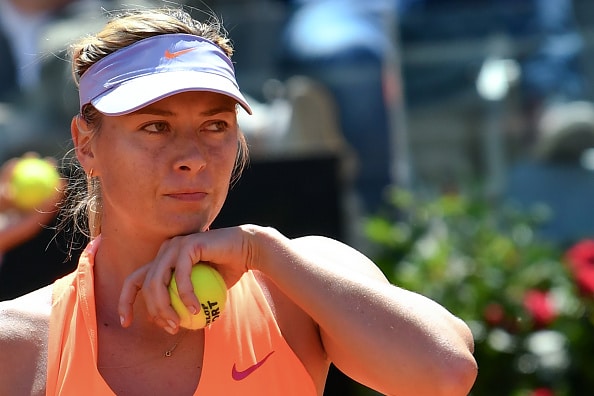GARY LEMKE says French Open organisers took the moral high ground by denying Maria Sharapova a wildcard entry.
The French are known for their champagne and the whole tennis world should be popping a few bottles of their finest in celebration of one of their bravest men. Step forward Bernard Giudicelli, the president of the French Tennis Federation.
‘It’s my responsibility to protect the game, to protect the high standards,’ Giudicelli said, snuffing out any hopes – perhaps even expectations – of Sharapova being given a wildcard into the second Grand Slam of the year, the French Open on the famous red clay of Roland Garros.
‘There can be a wildcard for people returning from injuries, there cannot be a wildcard for people returning from doping,’ Giudicelli added.
Game, set and match. A victory for those who are trying to keep sport clean.
Giudicelli’s actions seem to mirror those of many of Sharapova’s rivals in the locker room.
‘I was actually quite inspired before the match because I had a lot of players coming up to me privately wishing me good luck,’ said Canadian starlet Eugenie Bouchard after beating Sharapova in the Madrid Open in early May. ‘Players I don’t normally speak to, getting a lot of texts from people in the tennis world that were just rooting for me. I wanted to do it for myself, but also all these people. I really felt support. It showed me that most people have my opinion, and they were just maybe scared to speak out.’
We are reminded of the backdrop to the story.
After losing to Serena Williams at the 2016 Australian Open, Sharapova called a press conference to reveal that she had tested positive for Melodium, a substance placed on the World Anti-Doping Agency (Wada) banned list at the start of 2016. She pleaded ignorance, saying that she’d taken it for some 10 years and neither she, nor her entourage – she’s no ‘naive individual’, considering that Forbes put her wealth at nearly $300-million – ‘read the emails sent out’ saying Melodious had been listed as a banned substance.
Wada president Dick Pound described Sharapova’s actions as ‘reckless beyond description’ at the time.
Sharapova’s ‘unfairly harsh ban’ of two years, as she called it, was reduced on appeal through the Court of Arbitration for Sport and in April she returned to the women’s tour after a 15-month break.
The 30-year-old Russian has been one of tennis’ marquee acts for over a decade and the former world No 1, a five-time Grand Slam singles winner, is widely considered women’s sport’s most marketable face. She is a corporation in itself, with specialists in a variety of fields helping her. And not one of them realised that Melodium was placed on the banned list at the beginning of 2016.
Melodium is used to treat ischaemia. In layman’s terms that’s a lack of blood flow to parts of the body, particularly in cases of angina or heart failure. It’s also used to treat an irregular heartbeat. You get the message: its primary use is to treat patients with a heart condition, not finely tuned international athletes. Cardiologists refer to it as Mildronate.
It is manufactured in Latvia and only distributed in Baltic countries and Russia. Significantly, the drug increases blood flow, which improves exercise capacity in athletes. Ahem.
Sharapova said she had been taking the drug since 2006 for health problems and had ‘not tried to use a performance-enhancing substance’. She argued she was unaware the drug had been added to the World Anti-Doping Agency’s banned list and could not ‘accept’ the ‘unfairly harsh’ ban.
Since returning from the 15-month ban, Sharapova has worked herself into a position whereby she is eligible to play in the qualifying rounds at Wimbledon, and the presumption is that she will win her way through and be included in the main draw towards the end of June.
That avenue doesn’t exist for her at the French Open and the door to her competing in Paris was through a wildcard. Thankfully, Bernard Giudicelli has firmly shut that door in her face – taking the moral high ground where so many others find it easier to accommodate a marketing and financial drawcard.
Photo: Silvia Lore/Getty Images





